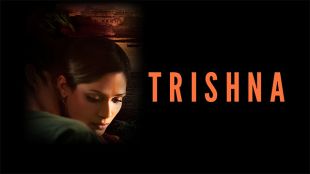
With his willingness to continually tackle new subjects in a variety of different styles, Michael Winterbottom has built one of the most fascinating and eclectic filmographies of any British director. Trishna, his India-set modernization of Thomas Hardy's novel Tess of the d'Urbervilles, is no exception.
The movie stars Freida Pinto as the title character, a poor citizen in Rajasthan who lives with her very large family. One day, thanks to a variety of circumstances, she meets Jay (Riz Ahmed), the son of a hotel mogul who has ordered him to learn the business. Jay hires Trishna to work at the establishment, allowing her to send a great deal of money home to her impoverished family. The two eventually fall in love, but their class differences, as well as money troubles, pose problems for them. All the while, Trishna dreams of making it out of her humble beginnings permanently.
Pinto shot to fame with her debut performance in Danny Boyle's Oscar-winning Slumdog Millionaire, and she's continued to work with strong directors on various projects. Few actresses can boast that their first five movies involved Woody Allen, Julian Schnabel, and a smash-hit sci-fi film (Rise of the Planet of the Apes). Her role in Trishna is demanding; this is a downtrodden character who dreams big even though her resources to act on her desires are so painfully limited. Pinto is more than talented and attractive enough to get us to sympathize with the character's plight -- but at the same time, the film is so good at creating a feeling of stifling frustration that Trishna turns into a slow-motion train-wreck. We can see how this world is going to close in on her, making the entire story into more of a tragedy than a drama.
As usual, Winterbottom takes great care to immerse us in a specific place. The India we see here isn't the flashy squalor of Slumdog, but a dusty, hot trap for our heroine -- you might feel like you're sweating just gazing at it. Conversely, the hotel where she goes to work is presented like an idyllic respite, although Winterbottom is far too savvy a director to let those places stand as symbols for just one aspect of our heroine's life. She's unable to find relief from the pressures of her existence, even in sweeping outdoor vistas or plush hotel rooms with high ceilings.
Michael Winterbottom remains one of the most surprising and ambitious directors of his time. His choice to have a film this sad and tragic as the follow-up to his wonderfully funny comedy The Trip is a reflection of his ability to jump from genre to genre with a skill that very few directors of any era have possessed.
